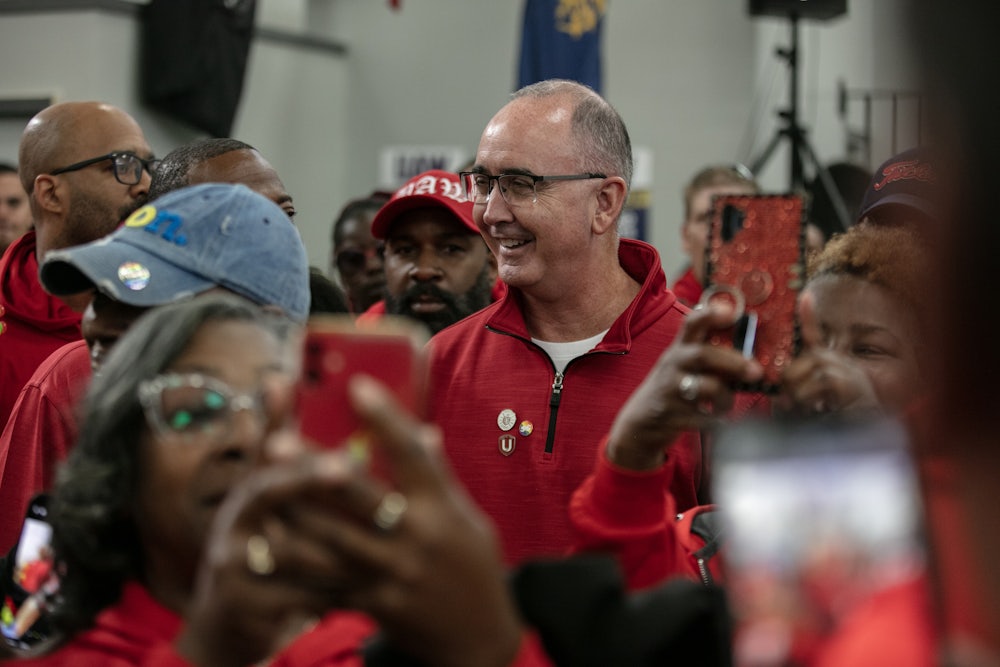Wearing a T-shirt bearing the slogan “Eat the Rich,” United Auto Workers president Shawn Fain recently announced that General Motors had agreed to include workers making its electric vehicle batteries in the UAW contract and allow union representation. “We’ve been told for months that the E.V. future must be a race to the bottom,” Fain said. “And now we’ve called their bluff.” The automakers’ plan was to replace traditional auto work with low-wage jobs, he said, but “we had a different plan.”
These victories—the outcome of an extraordinarily effective rolling strike against the Big Three auto companies, Ford, General Motors, and Stellantis—have changed the landscape of labor relations dramatically. But there’s also another ramification for those following the decarbonization fight: Fain and the UAW may be ending the culture war on electric vehicles and robbing the Republicans of anti-climate talking points.
While I am an active UAW member, I am not an autoworker. But in the past few years, it’s become increasingly apparent that, having no plans to make working-class people’s lives better or address the climate crisis, Republicans wish to stoke a culture war over Biden’s climate policies by exploiting anxieties about electric vehicles. This column represents my opinion, alone—but in my opinion, Fain isn’t having it; his rhetoric shows how to disregard the nonsense and address the real challenges for the auto industry.
Republican discourse on E.V.s exploits anxieties that are partly sexual, playing into some straight men’s concerns that eco-friendly behaviors are perceived as feminine or gay, which I’ve written about here. When Donald Trump says the phrase “electric vehicles,” with a bit of overemphasis, we all recognize it as mockery. But it’s also particularly reminiscent of the way a homophobic guy speaks when jeering at what he imagines is gay elocution.
Republicans also exploit economic anxieties about the transition to greener energy sources, prophesying (baselessly) that Biden’s climate policies will end in economic disaster. When Trump met with nonunion autoworkers this fall in Detroit, during the UAW strike, he gave a speech undermining the union’s historic fight for a better contract, telling the workers that the strike “doesn’t make a damn bit of difference” because, he said, in two years, the auto companies would be out of business and the workers will all lose their jobs.
In addition to this sort of gaslighting (pardon the pun), Trump also exploits xenophobic fears about E.V.s. Last year, at a rally in Wilkes-Barre, Pennsylvania, the former president delivered an incoherent rant about a friend of his who, he said, regretted buying an electric car. Besides, Trump added, “people can’t afford them,” and “the batteries are made in China.” (These are all issues that Biden’s E.V. subsidies help address, but that’s irrelevant to the GOP’s manufactured culture war.)
Trump’s not the only Republican sounding this alarm. Senator J.D. Vance (author of Hillbilly Elegy) has been attempting to roll back the E.V. subsidies in the Inflation Reduction Act, arguing that they’re “green energy daydreams” that will send jobs to China, although they are likely to do the opposite (and, as my TNR colleague Kate Aronoff pointed out earlier this fall, Vance himself is no friend to the autoworkers).
This foolishness looks even more foolish now, as United Auto Workers President Shawn Fain, who has just presided over the biggest labor victory in decades, may have just rendered the Republican posturing on E.V.s irrelevant. That’s because United Auto Workers’ recent victory over the Big Three automakers makes significant strides toward creating green jobs in their industry.
Though concerned that companies were using the transition to electric vehicles to further exploit workers, Fain never borrowed the language of the right-wing culture war. Instead, he said he welcomes the transition away from fossil fuels. “We support a green economy,” he said in September. “You know, we have to get behind this. We have to have a planet that we can live on.”
But Fain has insisted all along that companies can’t get away with making these changes at the expense of the working class. A slogan on some of the UAW signs during the strike has been “Every Auto Job a Good Job,” with the first two letters (E and V) emphasized in bold blue.
These aren’t just words. Members will vote on these contracts in mid-November. They include huge steps, in some cases giving workers in E.V. vehicle and battery plants the same contract as current UAW workers. The UAW has also won other important elements of a just transition to the carbon-free economy. Stellantis, for example, had closed its Belvidere assembly plant, north of Chicago, in February. The company agreed to reopen it and locate a battery factory there, so that working-class community doesn’t lose jobs.
Fain is not done. He may be following the successful six-week strike by working to unionize a powerful market leader: Tesla, owned by the rabidly anti-union Elon Musk. He has called Honda, Toyota, and Tesla “UAW members of the future,” and Bloomberg has reported that workers are already organizing at a Tesla plant in Fremont, California, with 20,000 workers.
If the transition to electric vehicles brings good jobs to communities all over the country, Republicans will have little left to say about Democratic climate policy other than middle school taunts (Your car is gay!), which won’t be compelling on their own. If Biden carries Midwestern swing states next November, he may have Fain to thank for deflating this line of Republican attack. Given how little Republicans have to offer working-class people materially, another culture war is always in the works, but Shawn Fain may have pulled the plug on this one.










